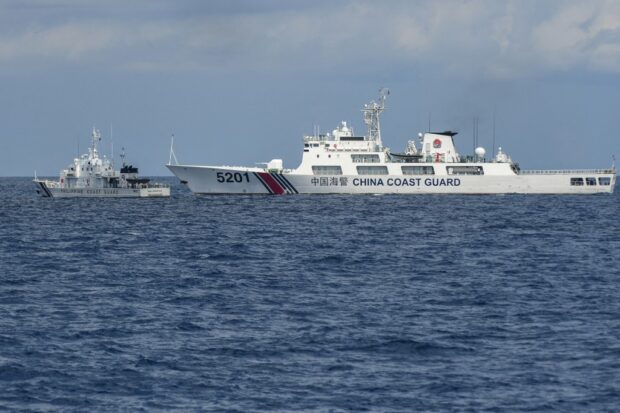
This photo taken on April 23, 2023 shows the Philippine coast guard vessel BRP Malapascua (L) manoeuvering as a Chinese coast guard ship cuts its path at Second Thomas Shoal in the Spratly Islands in the disputed South China Sea. AFP was one of several media outlets invited to join two Philippine Coast Guard boats on a 1,670-kilometre (1,040-mile) patrol of the South China Sea, visiting a dozen islands and reefs. Beijing claims sovereignty over almost the entire South China Sea, including the Spratly Islands, ignoring an international ruling that the assertion has no legal basis. (Photo by Ted ALJIBE / AFP)
MANILA, Philippines — China is pushing back against any move to interfere in the South China Sea issue, saying the disputed territory is “not a hunting ground for forces outside the region.”
Beijing’s ministry of foreign affairs spokesperson Mao Ning said this in a news briefing on Thursday when asked about the bilateral security guidelines between the Philippines and the United States, where the latter vowed to back Manila against any attack in the contested waters.
The Chinese Embassy in the Philippines shared a brief transcript of Mao’s response, saying that through the collective effort of countries in the region, waters in the South China Sea are not as turbulent since they have “maintained overall stability.”
“The US-Philippines defense guidelines is a bilateral arrangement. China firmly opposes any country’s move to meddle in the South China Sea issue to harm China’s territorial sovereignty and maritime rights and interests by citing the guidelines,” she said.
“I would like to stress that the South China Sea is the shared home for countries in the region, not a hunting ground for forces outside the region. When regional countries are committed to mutual trust, solidarity, cooperation and properly handling differences, they have in their hand the key to peace and stability in the South China Sea,” Mao added.
China claims nearly the entire South China Sea, including the West Philippine Sea–waters within the Philippines’ exclusive economic zone–and its potential offshore oil and gas deposits and traditional fishing grounds.
A 2016 ruling by the Permanent Court of Arbitration junked China’s sweeping claims in the disputed waters, reaffirming Philippines’ claims over the West Philippine Sea.
But Beijing has repeatedly undermined the United Nations-backed tribunal’s decision.
US has PH’s back
Earlier on Thursday, top defense officials of the Philippines and the United States ironed out bilateral defense guidelines that would modernize alliance cooperation for a “free and open Indo-Pacific region.”
“Recognizing that threats may arise in several domains – including land, sea, air, space, and cyberspace – and take the form of asymmetric, hybrid, and irregular warfare and gray-zone tactics, the guidelines chart a way forward to build interoperability in both conventional and non-conventional domains,” a fact sheet released by the US Department of Defense stated.
READ: PH, US set bilateral defense guidelines to ‘modernize alliance cooperation’
US Secretary of Defense Lloyd Austin told Philippine President Ferdinand Marcos Jr., who is the US for an official visit, that the global power “will always have your back in the South China Sea or elsewhere in the region.”